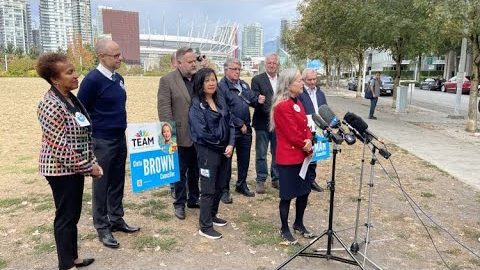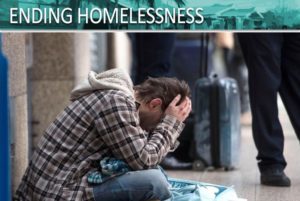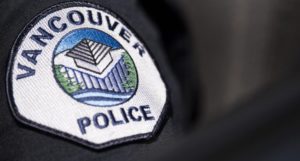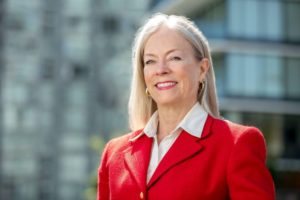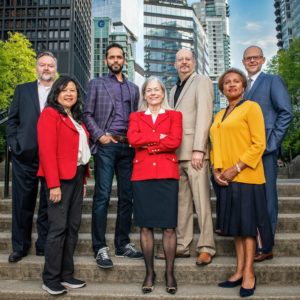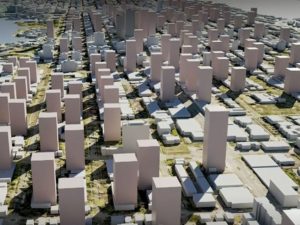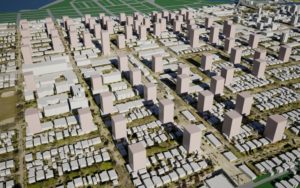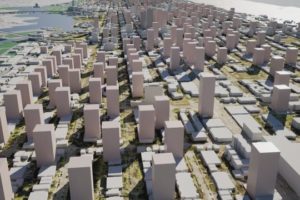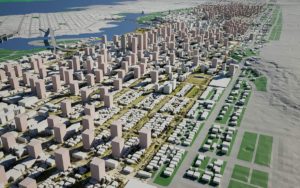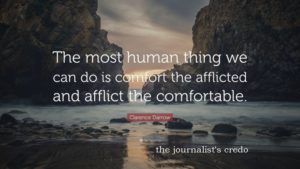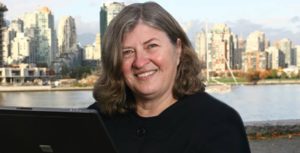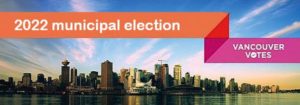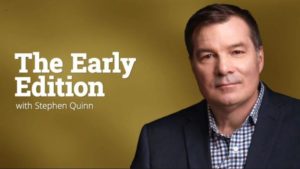Yesterday morning, Vancouver civic election Mayoralty candidate Colleen Hardwick, and members of her TEAM … for a Livable Vancouver slate of Council candidates introduced their viable and innovative affordable housing plan.
Within 18 months of being elected to office, a majority TEAM … for a Livable Vancouver Council would bring forward a binding referendum to ask the citizens of Vancouver to allow TEAM to borrow $500 million dollars — amortized over a 35-year borrowing plan — to build 2,000 co-operative housing units in neighbourhoods across the city, providing homes for up to 5,000 Vancouver residents (many of those who would reside in Co-op housing would be families with children — as a rule of thumb when constructing new housing a 2.5 multiplier is employed).
 Co-operative Housing Built By Bosa Development as a Community Amenity Contribution
Co-operative Housing Built By Bosa Development as a Community Amenity Contribution
Ms. Hardwick also suggests that should the federal and provincial governments come on board to support and match the expenditure of monies proposed by TEAM … for a Livable Vancouver, as most assuredly would be the case, we’d be looking at 6000 new units of Co-op homes, housing up to 15,000 Vancouver citizens, before the end of the next municipal term of government — that means affordable housing for you, your children and your grandchildren, low income seniors, wage earners, and more, who are currently underhoused, or are considering leaving the city because there’s simply no affordable housing to be found.
As you will hear in the video of the press conference located at the top of today’s post, Mayoralty candidate Hardwick expresses the housing mix of future Co-op owners (co-op housing is owned collectively, under Canada Mortgage and Housing Corporation guidelines) as one-third, one-third, one-third.

Here’s what the one-third, one-third, one-third mix of residents in a housing co-op means: one third of members who live in a housing Co-op receive a deep subsidy — this group usually involves seniors on a meagre pension income, those persons in single parent households, and persons with disabilities. The second one-third grouping consists of wage earners, and persons in the creative industry, who earn an income of under $60,000 annually. Subsidy is provided to Co-operatives across Canada through a Federal Housing Co-operative Subsidy Fund.
The final third in the housing co-operative resident mix are those earning between $60,000 and $80,000 a year. These persons pay a low-end of median market rental rate — an explanation of which is available in VanRamblings’ Sept. 6, 2022 post. The CMHC-determined median market rental rate is generally half of the market rate.
As VanRamblings has resided in a housing co-operative for forty-plus years, allow us to explain how Co-ops work, and what TEAM … for a Livable Vancouver intends.

Co-operative housing was developed by the Pierre Elliott Trudeau-led federal Liberal government in the 1970s as a means of providing affordable housing for wage earners, members of the creative community, seniors and persons with disabilities, as well as for persons earning under $80,000 a year — the latter group paying a low-end-of-market housing charge rate, subsidizing those with lower incomes. 2500 housing co-ops were developed across Canada over a 10-year span, providing affordable housing to 135,000 Canadians, in every region of our nation.
Here’s how housing co-ops work. Each member of a co-op is owner of her or his home — sometimes it’s a townhouse, other times it’s row housing, or an apartment / condominium style housing typology. A member makes a refundable share purchase on being accepted into the Co-op — generally, the share purchase amounts to one month’s housing charge. For those who struggle to pay the share purchase, often the Co-op will add a portion of the share purchase to a household’s monthly housing charge — alternatively, the CCEC Credit Union offers a no interest share purchase loan to prospective Co-op members.
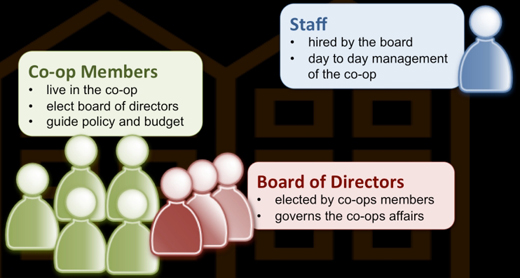
Housing co-operatives require member participation in the operation of the Co-op.
- An Executive Committee — a President, Vice-President, Secretary and Treasurer — are elected at the Annual General Meeting of the Co-operative. The Executive is the Co-operative’s legally responsible body, under British Columbia’s Society Act, that ensures the good operation of the Co-operative. The Executive is responsible for the economic rectitude of the Co-operative, and must arrange for the conduct of an annual audit of the Co-operative’s fiscal operation. Every member — often, that includes children — must participate in the life of the Co-operative, and sit on one of three Co-op Committees: the Finance, Membership or Maintenance Committee.
Generally, there are work parties twice a year, collective Co-op cleaning activities, usually held in the autumn, and again in the early spring. The work required of members is rarely onerous — rather it’s a grassroots means for members to participate in the affairs of the Co-op that contributes to the livability of the Co-operative.
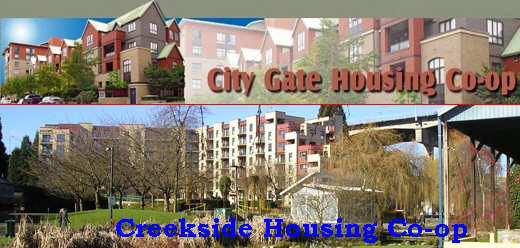
Phase 2 housing co-ops: co-operative housing built along the south shore of False Creek in the 70s/80s
Quite honestly, TEAM … for a Livable Vancouver’s affordable housing plan is the only viable affordable housing plan VanRamblings has seen published as policy in any of the 10 civic party’s policy handbooks, whose affordable housing policies are little more than a chimera, an ephemera trotted out as a faux election promise only.
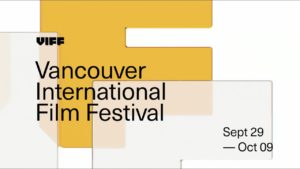
Tomorrow, VanRamblings will be writing about the Vancouver International Film Festival, which kicks off its glorious, much-anticipated 41st annual edition today.
As we won’t be back writing about the election until Monday, October 3rd, for perusal over the upcoming weekend, we’ll leave you with …
Video of the Business in Vancouver Mayoral Forum held at The Terminal City Club on Tuesday evening, September 27th, with all five Mayoral candidates on hand, the event moderated by Kirk LaPointe.
